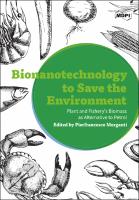Bionanotechnology to Save the Environment
Plant and Fishery's Biomass as Alternative to Petrol
Contributor(s)
Morganti, Pierfrancesco (editor)
Language
EnglishAbstract
Nanotechnology is the science of manipulating atoms and molecules in the nanoscale thousand times smaller than the width of a human hair. The world market for products that contain nanomaterials is expected to increase enormously in the future. The use of nanotechnology has stretched across various streams of science, from electronics to medicine and has also found applications in the field of cosmetics. How will this revolution impact our lifestyle and our planet? Very often the progresses of science, human knowledge and evolution of our lifestyle has been associated with devastating effects on our forests, oceans and more in general on our planet. The real challenge in the years to come is the sustainability of human evolution. The reader of this interesting book will discover how nanotechnology, and in particular nanomaterials derived from plant biomass and fishery’s waste, can improve the quality of our environment by reducing carbon emissions, improving the recycling of materials and even, in the long run, became a profitable business. Green nanotechnologies can be applied to a huge number of products ranging from intelligent textiles to smart drugs or functional polymers which can have a big impact on our daily lives, but nevertheless help us in saving our biodiversity and our planet. However, to fully achieve all these benefits, companies and scientists should be supported by National and International Agencies and Institutions in order to facilitate and support scientific development in this field allowing from one side the protection of intellectual property, but on the other giving accessibility of these technologies to emerging countries for improving the quality of life and the environment all over the world equally.


 Download
Download Web Shop
Web Shop